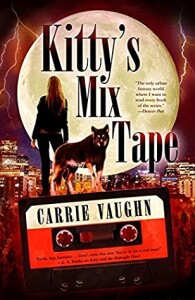 Carrie Vaughn is an experienced hand at urban fantasy, and Kitty’s Mix Tape is a nice collection of shorter works set in one of her milieus. These stories range from the distant past to after the end of the Kitty Norville book series, and feature a wide variety of characters from that setting. It is a fascinating range of stories that veers from detective fiction, to period romance, to war drama and beyond. Indeed, there is a little something for everyone in these stories, and as such they serve as an impressive look at Vaughn’s talents.
Carrie Vaughn is an experienced hand at urban fantasy, and Kitty’s Mix Tape is a nice collection of shorter works set in one of her milieus. These stories range from the distant past to after the end of the Kitty Norville book series, and feature a wide variety of characters from that setting. It is a fascinating range of stories that veers from detective fiction, to period romance, to war drama and beyond. Indeed, there is a little something for everyone in these stories, and as such they serve as an impressive look at Vaughn’s talents.
“The Beaux Wilde” is something of a historical romance. A young woman named Amy finds the attempts by various men to romance her rather trying for one reason or another. She is taken to dances by many men, knowing the proper thing to do, yet finds herself uncomfortable in crowds and annoyed that these men clearly only see her as a way to get to her money. The story serves simultaneously as a picture from the period and a nice illustration of the many ways women suffered at the time. Amy’s ability to detect this so clearly is similarly multifaceted, both a sign of intellect and a hint of something more.
At one such dance a group of men calling themselves the Wilde brothers appears. It is a little surprising to all involved, and one named Edward seems to make an instant connection with Amy. Readers can probably guess what is unique about these “brothers” even before it’s mentioned that they come from the woods.
This particular story illustrates why tone is so important. While structurally it there is a resemblance to parts of Bram Stoker’s Dracula, the tone manages to keep the story romantic in the same vein as a work by the Bronte sisters. It is a greatly appreciated combination, and speaks very well to the range of talents the author possesses. An event, even when eerie, is anything but a portent of the terrible, while the unknown man lurking around the corner has a magnetism that is still quite fascinating.
There is also a question of found family which is briefly touched upon in the story, one in which the question of why a group of people are called brothers becomes steadily more clear as the taor continues. This is appreciated buy readers home today understand, and appreciate reference to, the many forms family can ultimately take.
Overall it is a very nice little work which packs a fair amount of story into a short space. Those who are looking for urban fantasy might be a little disappointed that it is a period piece, but the overall result is quite good.
“Kitty Busts the Feds” is both humorous and ominous in its way. Series heroine Kitty Norville is working with her sound technician on an episode of her radio show, which starts out with the quite humorous question of the legalization of pot in Colorado as it relates to the supernatural world. A fascinating little conversation about vampires and the ability to use inhaled drugs of various sorts is had, before an interruption quickly changes the direction of the story to something much more ominous.
The initial conversation is entirely believable to the type one would find in a late-night call-in show. The fact the supernatural is to some degree a matter of public knowledge increases the believeability of the conversations. The dark turn the story takes is, by contrast, unexpected, if entirely believable.
Specifically, members of a previously unknown Paranormal Security Administration separate Kitty from her sound technician and begin questioning her. She quickly notices disturbing behaviors, and at the point they ask her to provide names of any people of supernatural influence, Kitty realizes the obvious parallels. Indeed, she brings up the HUAC more than once during the story, and even cuts off one of the government agents when he offers a particularly cliched platitude.
It is a sharp dark turn, and the fact the story takes place after the 14 books series the character starred in will leave experienced readers as confused about the situation as any neophyte.
Kitty handles herself well given the circumstances, with a simple accounting of why she believes that this is overall a horrible concept, while at the same time a number of other recurring characters get to provide some very brief support, including making great use of the fact that her husband Ben is a lawyer.
At the end of the book comes an interesting section, in which the author discusses music she can relate to each story. Given the title of the volume this seems more than appropriate, and provides information that might be interesting to readers
Overall this volume represents a surprisingly broad range of stories, given they all share a setting and characters. Kitty’s Mix Tape is easy to recommend both to fans of the Kitty Norville series and to those who are not familiar with the series, giving a useful cross section of what a reader can expect and a delightful assortment of stories in general.
(Tachyon 2020)
